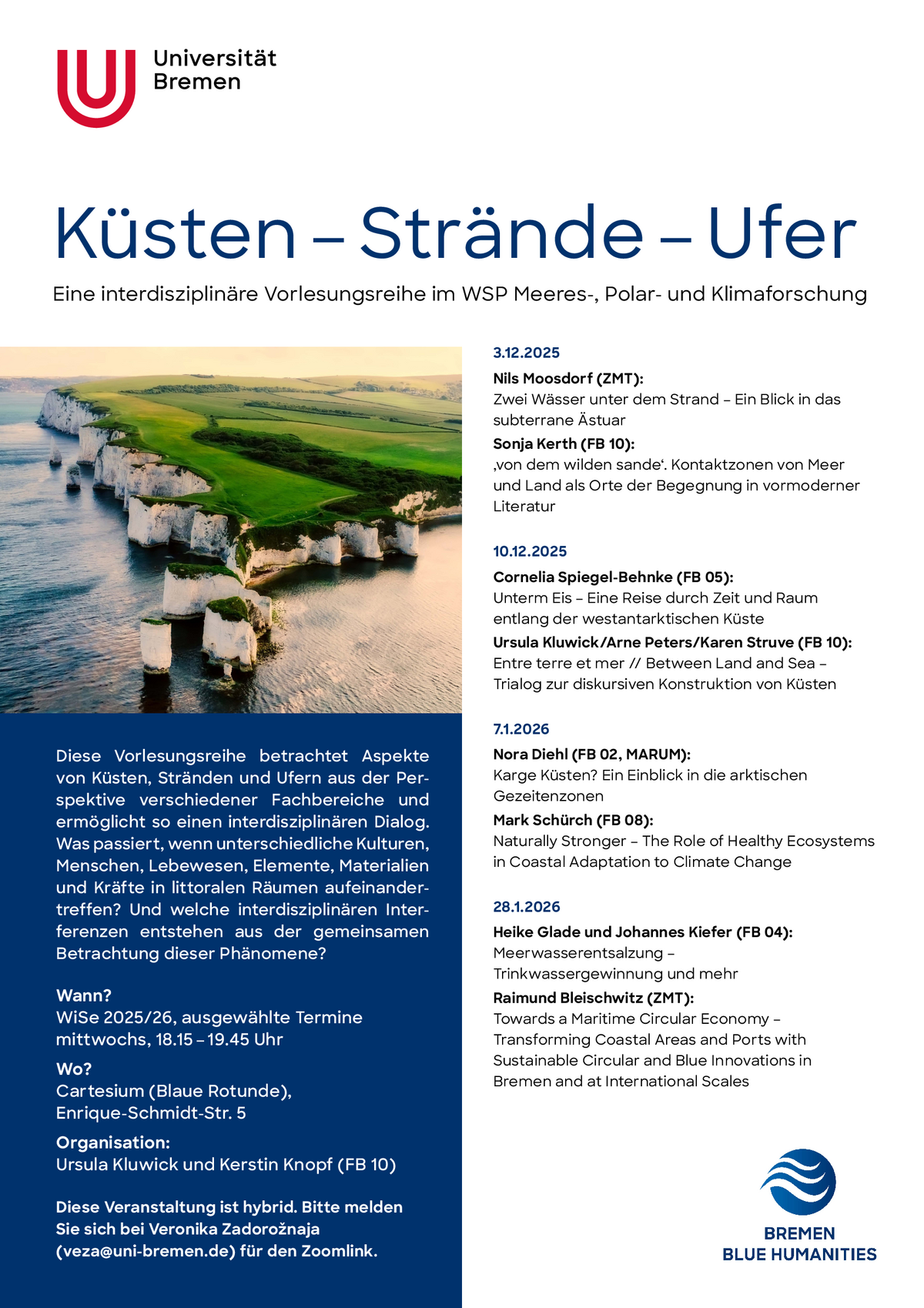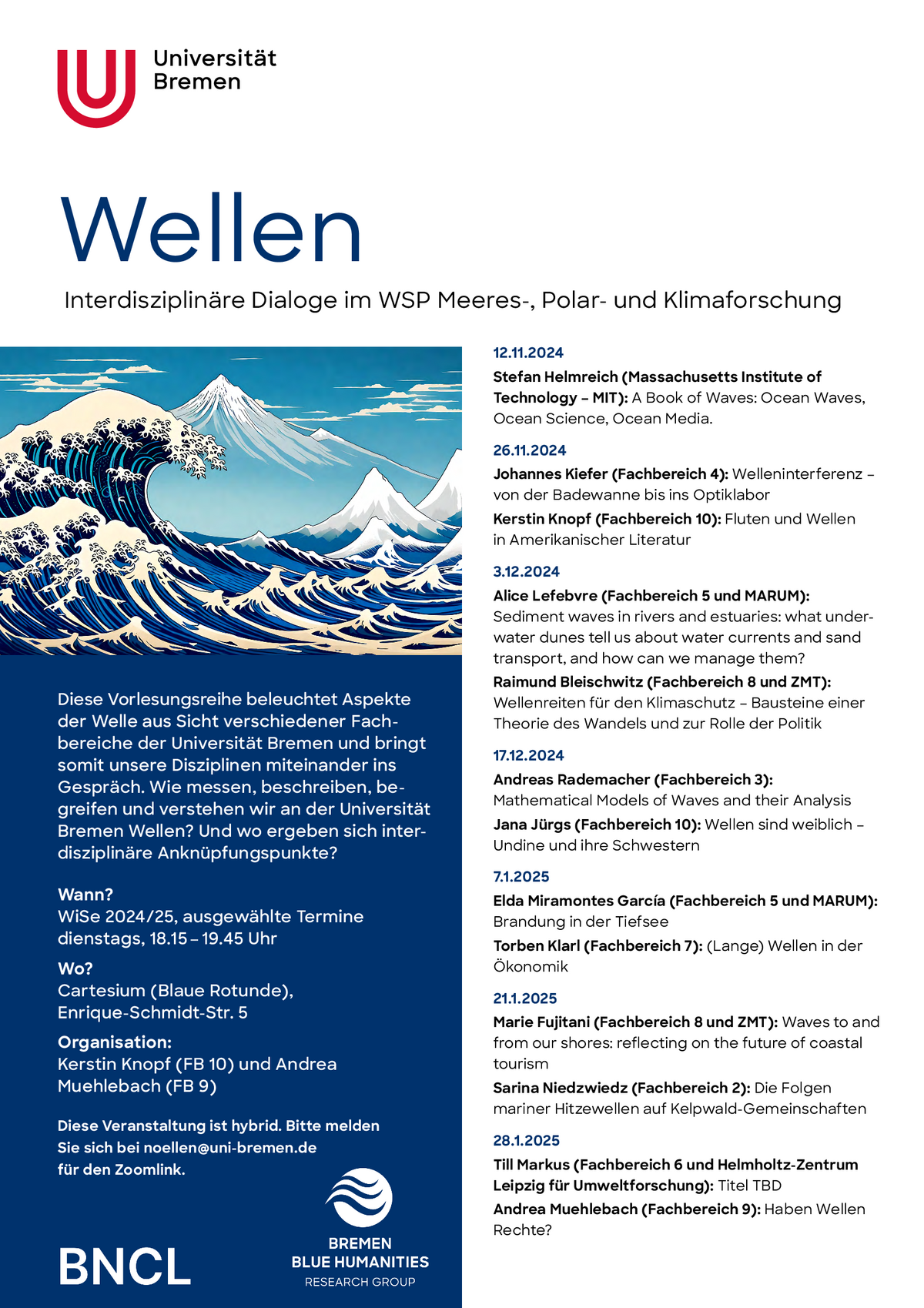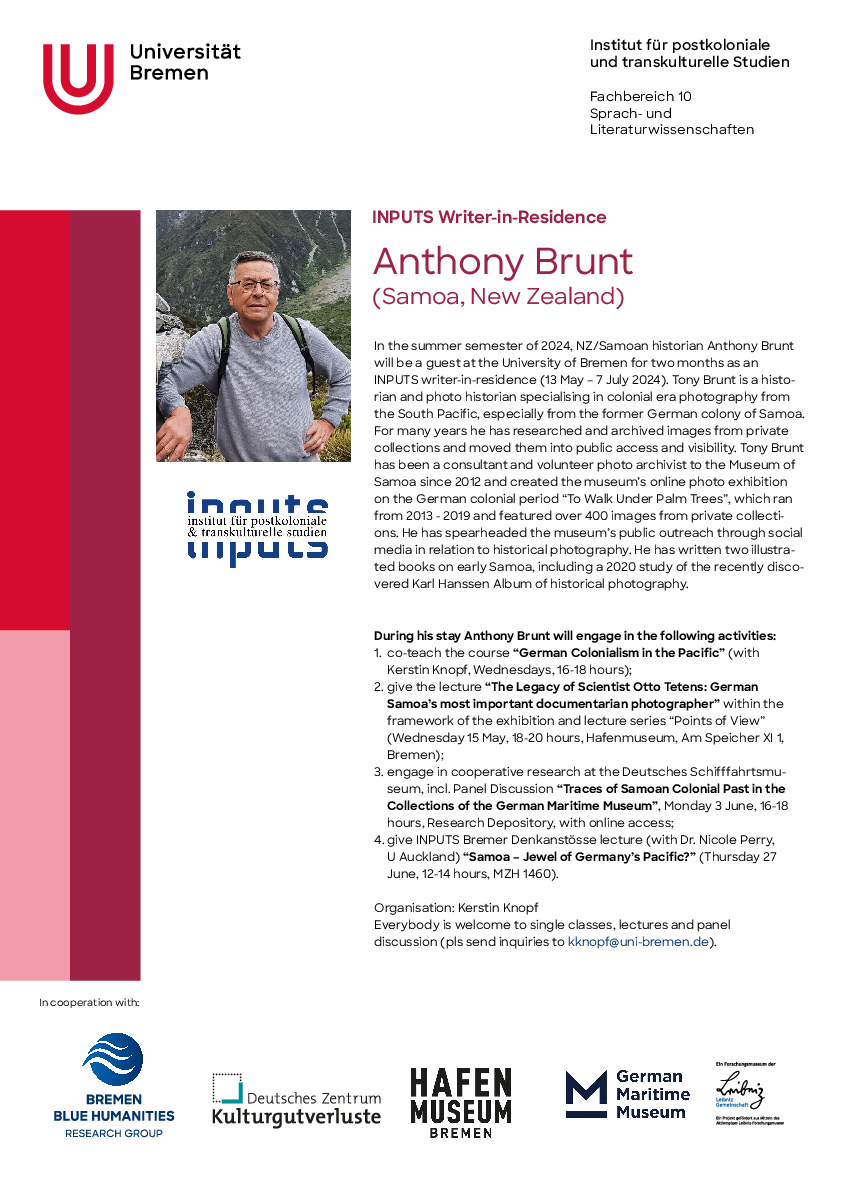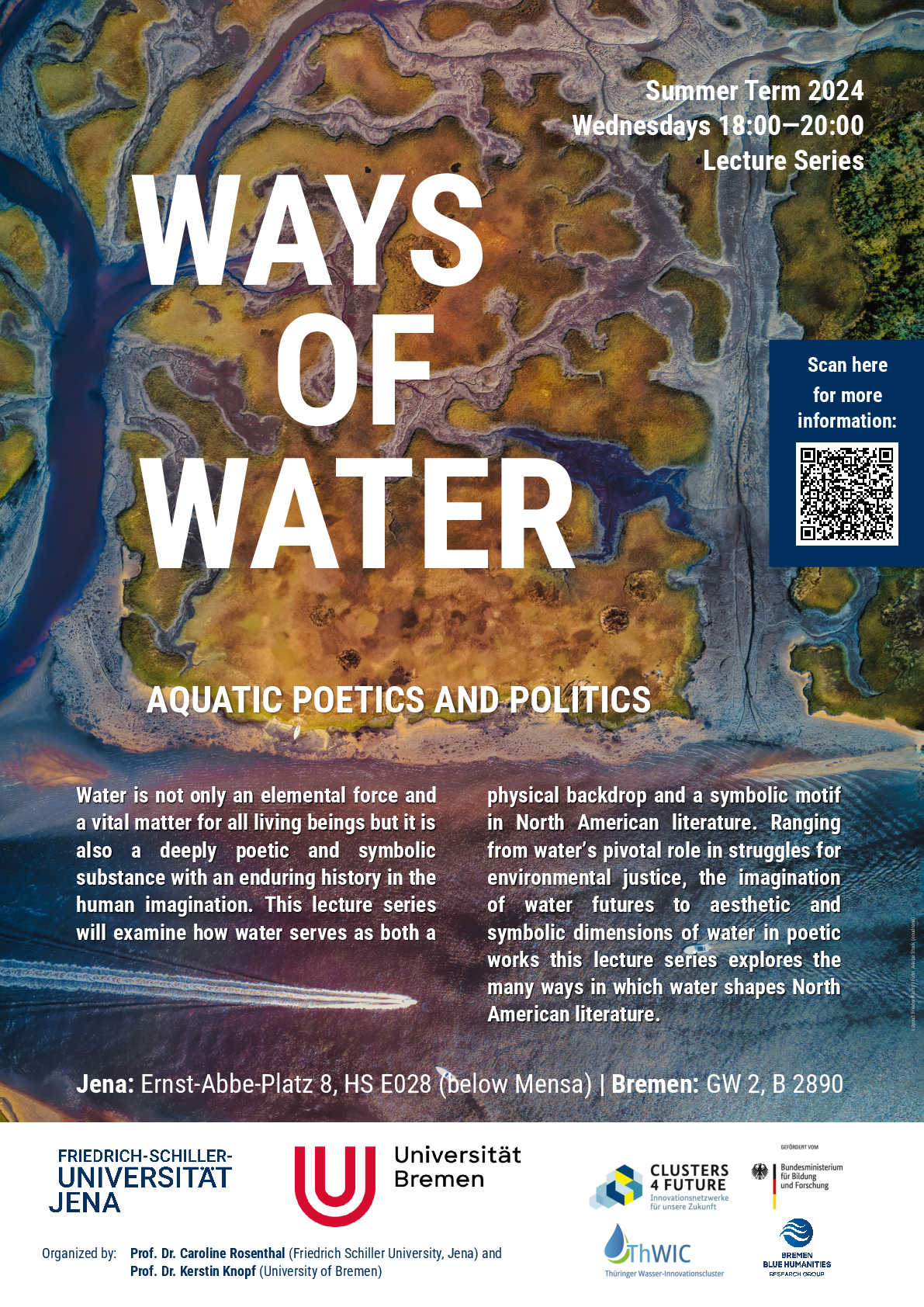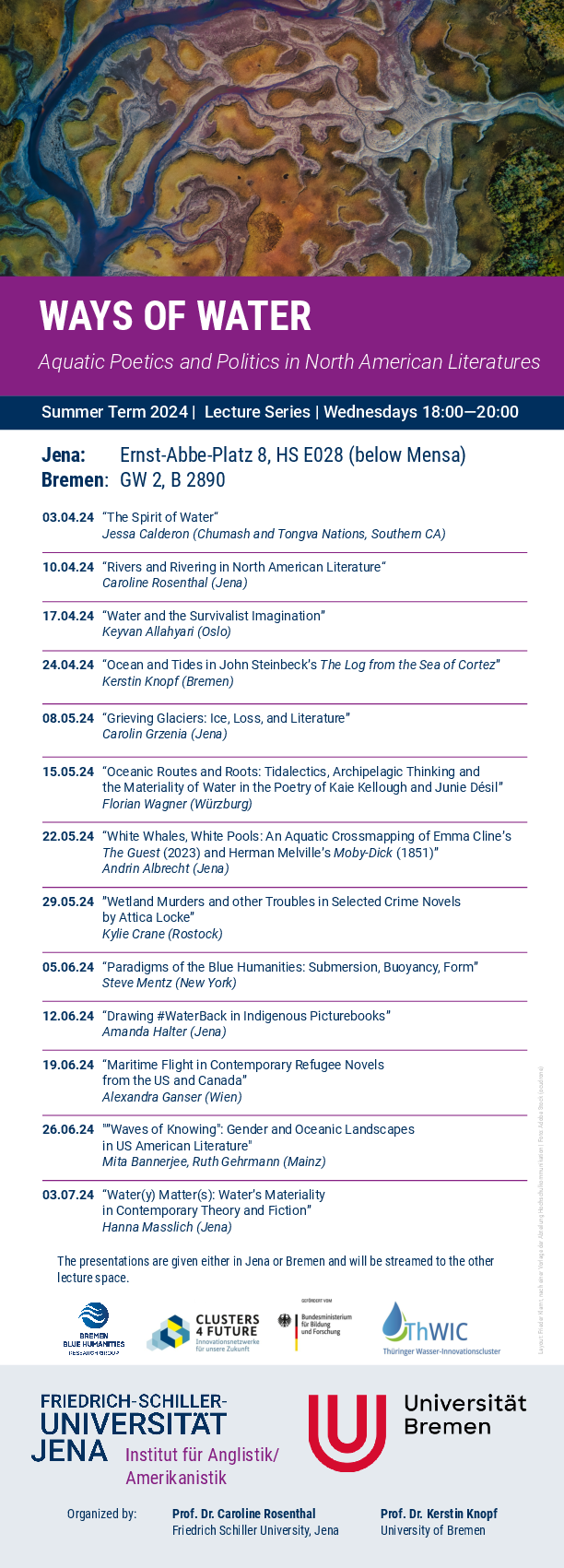Aktuelles
Küsten - Strände - Ufer
Eine interdisziplinäre Vorlesungsreihe im Wissenschaftsschwerpunkt Meeres-, Polar- und Klimaforschung
Diese Vorlesungsreihe betrachtet Aspekte von Küsten, Stränden und Ufern aus der Perspektive verschiedener Fachbereiche und
ermöglicht so einen interdisziplinären Dialog. Was passiert, wenn unterschiedliche Kulturen, Menschen, Lebewesen, Elemente, Materialien und Kräfte in littoralen Räumen aufeinandertreffen? Und welche interdisziplinären Interferenzen entstehen aus der gemeinsamen Betrachtung dieser Phänomene?
Wann?
WiSe 2025/26, ausgewählte Termine
mittwochs, 18.15 – 19.45 Uhr
Wo?
Cartesium (Blaue Rotunde),
Enrique-Schmidt-Str. 5
Organisation:
Ursula Kluwick und Kerstin Knopf (FB 10)
Diese Veranstaltung ist hybrid. Bitte melden Sie sich bei Veronika Zadorožnaja
(veza@uni-bremen.de) für den Zoomlink.
WasserWissen
Vorlesungsreihe im Rahmen der Wasserwochen Bremen
03.-24. Sept. 2025, jeden Mittwoch 17:00-18:30
Kraftwerk, Werdertor 2, 28199 Bremen
Wir begeben uns auf eine literatur- und kulturwissenschaftliche Reise: von filmischem Salzwasser im Pazifik zu Shakespeare, von fiktionalen Fluten in den USA bis ins All.
03.09.2025 Paula von Gleich: Salzwasser als Subjekt in Disneys Animationsfilm Vaiana (2016)
10.09.2025 Ursula Kluwick: Schwimmen mit Shakespeare
17.09.2025 Kerstin Knopf: Fluten in Amerikanischer Literatur
24.09.2025 Anna Auguscik: Von der Meerestiefe bis ins All: Der Blaue Planet aus der Perspektive der Blue Humanities
Organisiert von Paula von Gleich, Anmeldung unter wasserwochenprotect me ?!bremenprotect me ?!.de
Wasserwochen 2025
Bremen und Bremerhaven sind Wasserstädte und in unserem Landesbecken tummeln sich zahlreiche Akteure, die zu und mit Wasser arbeiten. Vom 22. August bis zum 28. September betreten sie auf den Wasserwochen erstmals eine gemeinsame Bühne. Zusammen machen sie die Bedeutung von Wasser für Umwelt, Gesellschaft und globale Gerechtigkeit in unserem wasserverbundenen Bundesland sichtbar.
Die Vielfalt der Akteure ist groß, die Vielfalt ihrer Themen noch größer. Die Wasserwochen zelebrieren genau diese nasse Vielfalt. Ob Schwammstadt, Weservertiefung, Mangrovenschutz, Wasseraufbereitung oder Virtuelles Wasser
– Hauptsache nicht zu trocken! Die Veranstaltungsformate reichen von Führungen und Ausstellungen über Filmabende und Diskussionsrunden bis hin zu einem Segeltörn und einem Tanzworkshop.
Vollständiges Programm und Infos unter: www.wasserwochen.org
Die Wasserwochen sind eine Initiative vom Wasserforum Bremen (BORDA, biz, BUND, Verein für Mangrovenschutz), dem Verein Altes Pumpwerk und der Professur für Siedlungswasserwirtschaft der Hochschule Bremen.

Coastal Futures – Water, Communities, Imaginaries
Guest lecture by Claire Waffel, Bauhaus-Universität Weimar
Friday, 20 June 2025
10:15-11:45, GW2 B1630, University of Bremen
Organized by Dr. Paula von Gleich as part of the MA English-Speaking Cultures seminar "Water and/in Cultural Theory."
In the context of a growing water crisis, this presentation focuses on a Welsh village predicted to be lost to rising seas in the near future. In contrast to common perceptions of the coastline as a fixed boundary disconnected from temporal change (Bezan & Neimanis, 2022), this presentation will examine the coastal zone through the concept of “thick time” (Neimanis & Walker, 2014), where past and future narratives illuminate the fluidity of water-land boundaries. Engaging in a performative walk along the village’s sea defences, architectural remnants become juxtaposed with future predictions and imaginaries. The presentation will take a multidisciplinary approach, incorporating video and photography. The aim is to create an embodied and situated visual narrative that brings a wider range of future possibilities to the fore.
Claire Waffel is an artist and Scientific Associate at the professorship of Arts and Research at the Bauhaus-Universität in Weimar, where she is currently pursuing a practice-based Ph.D. She works with lens-based media and speculative storying in order to produce situated, embodied and place-based accounts of climate change. Through compiling different methodologies into a visual language, her work aims to reveal relationships between communities, climate change and futures. Her research is situated at the intersection of artistic research, environmental humanities, STS and new materialism. She has previously exhibited her work among others at Maxim Gorki Theater, Berlin, Kunsthaus Dresden, Wilhelm Wagenfeld Haus, Bremen as well as MWW Wroclaw Contemporary Museum and been invited on different artists residencies internationally by the Goethe-Institut.
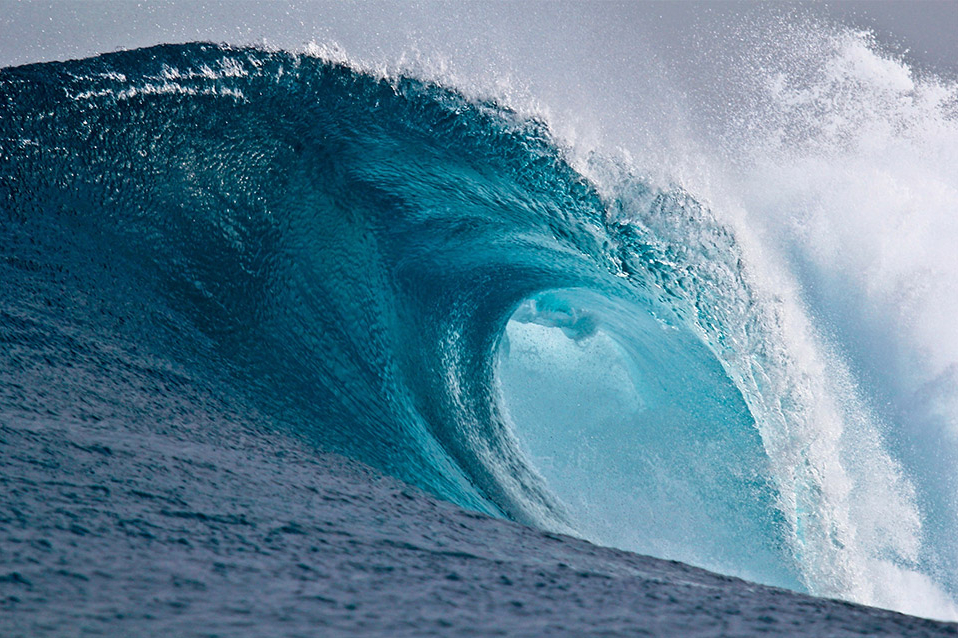
~Wellen~ Interdisziplinäre Dialoge im WSP Meeres-, Polar- und Klimaforschung
Vorlesungsreihe: Jeden zweiten Dienstag von 18:15–20:00, Rotunde im Cartesium an der Universität Bremen
Diese Vorlesungsreihe soll erstmals über alle Fachbereiche an der Universität Bremen hinweg ein interdisziplinäres Gespräch zu den Ozeanen – genauer gesagt zum Thema „Welle“ – ermöglichen. Die Welle lässt sich aus vielen Perspektiven beleuchten. Die Ozeanographie, Meteorologie und die Mathematik zum Beispiel zeigen auf, wie die Interaktion von Turbulenz, Wellen und Wirbeln im Ozean und der Atmosphäre das Klima und die Temperatur der Erde mitbestimmt. Unsere klimatische Zukunft misst sich unter anderem in Wellen verschiedener Größen, Schnelligkeiten und Ordnungen, in Tsunamis, „rogue waves,“ oder regelmäßigen Wellen.
Aber neben Messungen, Computersimulationen und Zukunftsprognosen in der ocean wave science kann man Wellen auch anders begreifen. So kennen die Ökonomie und Soziologie wellenartigen Phänomene. Die Kunst ist voll von ikonischen Wellendarstellungen, sei es in der Form der Malerei Rembrandts, der 1633 „Christus im Sturm“ auf einer riesigen Welle darstellte, bis hin zur berühmten The Great Wave of Kanagawa des japanischen Künstlers Katsushika Hokusai. Dann gibt es natürlich auch Wellen ganz anderer Art: Schallwellen, Gravitationswellen, elektromagnetische Wellen, oder auch die Welle als aquatische Metapher für politische Bewegungen und literarische und filmische Trends.
Diese Vorlesungsreihe soll verschiedene Aspekte der Welle beleuchten und somit unsere Fachbereiche miteinander ins Gespräch bringen. Wie messen, beschreiben, begreifen und verstehen wir Wellen in den verschiedenen Disziplinen? Und wo und wie ergeben sich interdisziplinäre Interferenzen und Anknüpfungspunkte?
Organisation: Kerstin Knopf (FB 10), Andrea Muehlebach (FB 9) kknopfprotect me ?!uni-bremenprotect me ?!.de und muehlebaprotect me ?!uni-bremenprotect me ?!.de
Diese Veranstaltung ist hybrid. Bitte melden Sie sich beinoellenprotect me ?!uni-bremenprotect me ?!.defür den Zoom link.
Termine
12.11.2024:
Stefan Helmreich (Massachusetts Institute of Technology (MIT)): Inaugural Lecture:A Book of Waves: Ocean Waves, Ocean Science, Ocean Media.
26.11.2024:
Johannes Kiefer (Fachbereich 4): Welleninterferenz – von der Badewanne bis ins Optiklabor
Kerstin Knopf (Fachbereich 10): Fluten und Wellen in Amerikanischer Literatur
3.12.2024:
Alice Lefebvre (Fachbereich 5 und MARUM): Sediment waves in rivers and estuaries: What underwater dunes tell us about water currents and sand transport, and how can we manage them?
Raimund Bleischwitz (Fachbereich 8 und ZMT): Wellenreiten für den Klimaschutz – Bausteine einer Theorie des Wandels und zur Rolle der Politik
17.12.2024:
Andreas Rademacher (Fachbereich 3): Mathematical Models of Waves and their Analysis
Jana Jürgs (Fachbereich 10): Wellen sind weiblich – Undine und ihre Schwestern
7.1.2025:
Elda Miramontes García (Fachbereich 5 und MARUM): Brandung in der Tiefsee
Torben Klarl (Fachbereich 7): (Lange) Wellen in der Ökonomik
21.1.2025:
Marie Fujitani (Fachbereich 8 und ZMT): Waves to and from our shores: reflecting on the future of coastal tourism
Sarina Niedzwiedz (Fachbereich 2): Die Folgen mariner Hitzewellen auf Kelpwald-Gemeinschaften
28.1.2025
Till Markus (Fachbereich 6 und Helmholtz-Zentrum Leipzig für Umweltforschung): Titel TBD
Andrea Muehlebach (Fachbereich 9): Haben Wellen Rechte?
Samoa – “Jewel of Germany’s Pacific?”
Guest Lecture by Tony Brunt (Auckland) and Dr. Nicole Perry (U Auckland)
On 27 June, 2024, 12-14 hours, we will have our INPUTS lecture Bremer Denkanstösse with Tony Brunt (Auckland) and Dr. Nicole Perry (U Auckland) on German colonialism in Samoa: Samoa – “Jewel of Germany’s Pacific?”. The lecture is in English. All are welcome.
INPUTS Writer-in-Residence
Anthony Brunt (Samoa, New Zealand)
In the summer semester of 2024, NZ/Samoan historian Anthony Brunt will be a guest at the University of Bremen for two months as an INPUTS writer-in-residence (13 May – 7 July 2024). Tony Brunt is a historian and photo historian specialising in colonial era photography from the South Pacific, especially from the former German colony of Samoa. For many years he has researched and archived images from private collections and moved them into public access and visibility. Tony Brunt has been a consultant and volunteer photo archivist to the Museum of Samoa since 2012 and created the museum’s long-running online photo exhibition on the German colonial period “To Walk Under Palm Trees”, which ran from 2013 - 2019 and featured over 400 images from private collections. He has spearheaded the museum’s public outreach through social media in relation to historical photography. He has written two illustrated books on early Samoa, including a 2020 study of the recently discovered Karl Hanssen Album of historical photography.
During his stay Anthony Brunt will engage in the following activities:
- co-teach the course “German Colonialism in the Pacific” (with Kerstin Knopf, Wednesdays, 16-18 hours);
- give the lecture “The Legacy of Scientist Otto Tetens: German Samoa’s most important documentarian photographer” within the framework of the exhibition and lecture series “Points of View” (Wednesday 15 May, 18-20 hours, Hafenmuseum, Am Speicher XI 1, Bremen);
- engage in cooperative research at the Deutsches Schifffahrtsmuseum, incl. Panel Discussion “Traces of Samoan Colonial Past in the Collections of the German Maritime Museum”, Monday 3 June, 16-18 hours, Research Depository, with online access;
- give INPUTS Bremer Denkanstösse lecture (with Dr. Nicole Perry, U Auckland) “Samoa – Jewel of Germany’s Pacific?” (Thursday 27 June, 12-14 hours, MZH 1460).
Organisation: Kerstin Knopf
Everybody is welcome to single classes, lectures and panel discussion (pls send inquiries to kknopfprotect me ?!uni-bremenprotect me ?!.de).
Points of View: The Legacy of Scientist Otto Tetens
May 15, 2024, Hafenmuseum Bremen
The Legacy of Scientist Otto Tetens: German Samoa’s most important documentarian photographer
Lecture by Anthony Brunt (Samoa/New Zealand), in English
There were three commercial photographers operating in Samoa during the German colonial period and also a number of amateur photographers among the settler community. Arguably, none can match the body of work of Otto Tetens, the astronomer who came to Apia in 1902 and spent several years setting up the Samoa geophysical observatory at Mulinu'u. His collection, most of it unrelated to his scientific endeavours, reflects a bold, even adventurous intrusion into Samoan and settler life to get the shots he wanted, clearly driven by a wide-eyed curiosity and fascination with his exotic new home in the South Seas. Photo historian Tony Brunt examines Tetens' large collection - much of it still unseen and held privately in Germany - and mines it for its enduring historical and cultural insights.
In the context of the exhibition Pointsof View_ Artistic and Scientific Perspectives on German Colonial History in the Western pacific (April 14 - August 18, 2024)
Tickets: 8 € / 6 €
HAFENMUSEUM BREMEN
Am Speicher XI 1 // 28217 Bremen
WAYS OF WATER: Aquatic Poetics and Politics in North American Literatures
Summer Term 2024 | Lecture Series | Wednesdays 18:00—20:00

BLUE HUMANITIES – SUMMER SCHOOL
SCIENCEHUMANITIES IN ASSOCIATION WITH FICTION MEETS SCIENCE INTERNATIONAL SUMMER SCHOOL
HWK Institute for Advanced Study (Hanse-Wissenschaftskolleg) | Delmenhorst GERMANY
MONDAY 3 JUNE – FRIDAY 7 JUNE 2024
Keynote Speaker: Steve Mentz (St John’s University)
Seminars by leading figures from: Environmental Humanities, Literature and Science, History of Science, History of Medicine, Philosophy of Science
Workshops on: Publishing; Academic Careers
The ScienceHumanities Summer School: Postgraduate, International, and Free
See https://cardiffsciencehumanities.org/summer-school/sciencehumanities-in-association-with-fictions-meets-science-international-summer-school/ for further details
In 2024, the Cardiff ScienceHumanities group partners with the Fiction Meets Science Program and Bremen Blue Humanities Research Group to host the Summer School at their home base in Germany. The theme for 2024 is the “Blue Humanities.”
The ScienceHumanities Summer School features a week of workshops with leading scholars who have trained in a diverse array of disciplines—literature, history, philosophy, sociology, environmental science—and are doing research at the cross-section of the humanities and sciences. Students have the opportunity to engage with experienced researchers and a select cohort of peers from around the world, attending workshops on current research topics and career issues (publishing, professional network-building, etc.). Anna-Katharina Hornidge (Bonn) will give the keynote address. Other speakers include Steve Mentz (New York) and Kerstin Knopf (Bremen).
In addition, you will have the opportunity to share ideas, concepts and methods with other doctoral students and begin to build a network of global contacts. The Summer School also incorporates a cultural programme focussed on the rich heritage of Bremen and the region.
The Summer School is open only to doctoral students located in universities and research centres worldwide. There are only 12 places available.
It is free to attend, but participants must be able to meet the cost of their own transport, accommodation and part of their subsistence during their stay at the HWK Institute for Advanced Study (Hanse-Wissenschaftskolleg), Delmenhorst. Advice will be given on accommodation and transport and meals will be included during the Summer School.
Two bursaries of £400 are available for students from nations with limited resources.
To express initial interest and receive an application form please email Professor Keir Waddington on waddingtonkprotect me ?!cardiff.acprotect me ?!.uk.
The closing date for expressions of interest is 23 February 2024. Applications must be submitted by 23 March 2024 and decisions will be communicated by early April 2024. Participating doctoral students must be able to commit to the full 5 days of the Summer School.
Interview mit Dr. Mohammed Muharram
Dr. Mohammed Muharram gab der Jadaliyya's Scholars in ContextSerie ein Interview.
"By weaving together postcolonial studies, the blue humanities, and Arabic literature and culture, my research can shed light on novel narratives and interpretations that are at once ecocritical, postcolonial, and deeply rooted in Arabic traditions and histories. This nuanced approach can provide a more holistic understanding of Arabic literature, emphasizing both the historical struggles of postcolonialism and the intricate relationship between people, culture, and the marine environment."
Hier geht's zum vollständigen Interview.
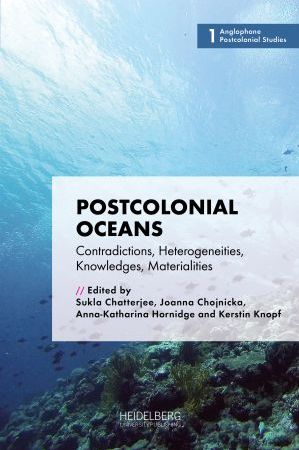
Neuerscheinung: Postcolonial Oceans: Contradictions, Heterogeneities, Knowledges, Materialities
herausgegeben von Sukla Chatterjee, Joanna Chojnicka, Anna-Katharina Hornidge und Kerstin Knopf
Dieses Buch leistet einen Beitrag zur Untersuchung von Ozeanen, Meeren, Küstengewässern und Flüssen im Kontext der Blue Humanities, indem es sich dem Thema Wasser aus verschiedenen epistemologischen, narratologischen, geografischen, kulturellen und disziplinären Perspektiven nähert und diese miteinander vernetzt.
Die Beiträger:innen aus Afrika, Asien, der Karibik, Europa, Nordamerika und dem Pazifik beschäftigen sich mit den Verflechtungen zwischen Ozeanen, Küstengebieten, Flüssen, Menschen, Tieren, Pflanzen, Organismen und Landschaften in den Bereichen Kulturgeschichte und Kulturwissenschaften, critical race theory und postkoloniale Studien, Meeres- und Umweltstudien, Linguistik, Literatur-, Film- und Medienwissenschaften.
Heidelberg University Press hat den Sammelband als Hardcover (60 Euro) sowie als open access E-Book im Angebot.
Lecture Series - Blue Humanities: Histories, Cultures, Literatures, and Media
Die neu gegründete Bremen Blue Humanities Research Group freut sich, die erste Ringvorlesung im WiSe 23/24 anzukündigen, jeweils Mittwoch 18-20 Uhr im Cartesium.

